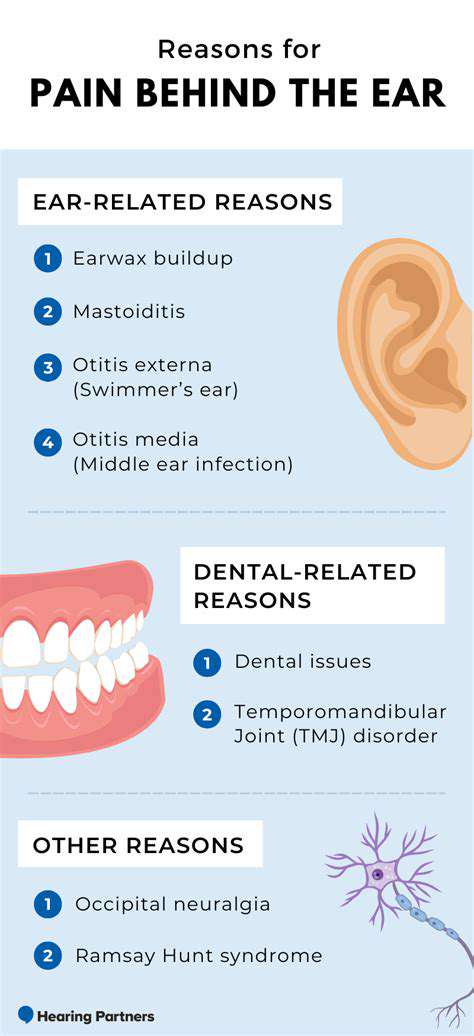Common Causes of Pain Above the Ear

Muscle Tension and Strain
One of the most prevalent causes of pain above the ear is Muscle Tension and Strain. This condition often arises from stress, poor posture, or prolonged activities that require repetitive head movements. When the muscles around the head and neck become strained, it can lead to discomfort and pain that radiates to the region above the ear. Individuals who spend long hours in front of a computer or perform tasks with their heads tilted can experience this. Addressing muscle strain typically involves rest, physical therapy, and stress management techniques.
Sinus Infections and Congestion
Sinus infections can also lead to pain above the ear, as the sinuses are located in close proximity to the ears. When the sinus cavities become inflamed or infected, they can cause pressure that manifests as pain in the upper region of the head. Symptoms often accompany sinus infections, such as nasal congestion, headaches, and fatigue. Over-the-counter medications can help alleviate these symptoms, but severe cases may require a consultation with a healthcare professional. Staying hydrated and using humidifiers can also provide relief from sinus-related discomfort.
Temporomandibular Joint (TMJ) Disorders
Disorders affecting the temporomandibular joint (TMJ) can result in pain that radiates to various parts of the head, including above the ear. TMJ disorders can stem from teeth grinding, jaw clenching, or misalignment of the jaw. The discomfort may be accompanied by popping or clicking sounds when moving the jaw. Treatment options include stress relief techniques, dental appliances, and in some cases, surgery for severe disorders. It's essential to consult with a dental or medical professional if TMJ-related symptoms persist, as they can guide you toward appropriate interventions.
Neurological Conditions
In some cases, pain above the ear may indicate an underlying neurological condition. Conditions such as migraines or cluster headaches can cause localized pain in the area above the ear. These headaches often come with additional symptoms like nausea, sensitivity to light, or visual disturbances. If you experience recurring episodes of severe pain, it is crucial to seek medical evaluation. Proper diagnosis and treatment are vital for managing these conditions effectively and improving quality of life.
Effective Remedies for Pain Relief
Over-the-Counter Pain Relievers
One of the most immediate and accessible remedies for pain above the ear is the use of over-the-counter (OTC) pain relievers. Anti-inflammatory medications such as ibuprofen or naproxen can help reduce swelling and alleviate pain. It's advisable to follow the recommended dosage instructions to ensure safety and effectiveness.
Additionally, acetaminophen can be an effective option for those unable to take NSAIDs. While it may not reduce inflammation, it can help to minimize pain and discomfort. Always consult a healthcare professional if you have concerns about using these medications, especially if you have pre-existing health conditions.
Cold and Heat Therapy
Applying cold or heat to the affected area can provide immediate relief from pain. Cold packs can help numb the area and reduce swelling, making them a great first step when pain is acute. A cold compress, applied for 15-20 minutes, can soothe irritation and help numb the throbbing sensation.
On the other hand, heat therapy may be beneficial for soothing muscle tension and promoting blood flow. A warm compress or heating pad can be applied after the initial pain subsides. It is important to avoid using heat if there is still significant swelling, as it may worsen the condition.
Rest and Relaxation Techniques
Sometimes, simply allowing your body to rest can be a highly effective remedy for pain above the ear. Stress can exacerbate pain conditions, leading to muscle tension, especially in the neck and jaw regions. Engaging in relaxation techniques such as deep breathing, meditation, or progressive muscle relaxation can help alleviate pain by reducing stress levels.
Additionally, ensuring that you get adequate sleep can have a profound effect on recovery. A well-rested body has a greater ability to heal and manage pain. Finding a comfortable sleep position that avoids pressure on the affected area can improve your overall comfort and well-being.
Seeking Professional Help
While home remedies can be effective, persistent pain above the ear may require professional evaluation. If over-the-counter medications and self-care strategies fail to provide relief, it's important to consult a healthcare professional. They can help determine if there is an underlying condition contributing to the pain, such as a sinus infection, dental issues, or even TMJ disorders.
Physical therapy or specialized treatments such as chiropractic adjustments may be recommended based on the diagnosis. In some cases, imaging tests may be necessary to rule out more serious concerns. Prioritizing your health through professional guidance can lead to more effective and tailored treatment options.